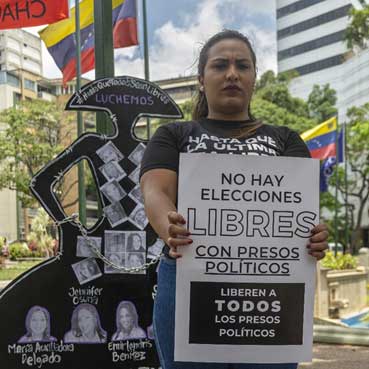
HAVANA TIMES – Venezuela’s 28 July presidential election could offer a genuine chance of democratic transition. Despite an array of challenges, the opposition is coming into the campaign unified behind a single candidate. Many Venezuelans seem prepared to believe that voting could deliver change.
But the authoritarian government is digging in its heels. The opposition reasonably fears the election could be suspended or the government could suppress the opposition vote. Large-scale fraud can’t be ruled out.
All credible opinion polls show that authoritarian president Nicolás Maduro, in power since the death of Hugo Chávez in 2013 and seeking a third term in office, is highly unpopular. But his United Socialist Party of Venezuela (PSUV) extensively controls the state apparatus. Electoral authorities aren’t neutral and the election system is riddled with irregularities. A recent decision by the government-controlled National Electoral Council (CNE) excluded from voting over five million Venezuelans who’ve emigrated.
If the opposition defeats the PSUV at the polls, the government will only accept the results if the costs of repression outweigh the costs of withdrawal. This means some form of exit guarantees will need to be agreed. An agreement to coexist would also be needed for a transition period that could last several years, during which PSUV supporters would continue to hold important positions and the party would need to be given the chance to reinvent itself as a participant in democratic processes.

Civil society in resistance mode
Venezuelan civil society has long played a key role in promoting democracy and defending human rights. But civic space has increasingly been shut down, with activists and journalists routinely subjected to threats, harassment, intimidation, raids, arrests, detention and prosecution by courts lacking any independence.
Many civil society organizations (CSOs) and media outlets have closed and others self-censor or have changed their focus to avoid reprisals. Numerous journalists, academics and activists have joined the exodus to other countries.
The government give repression legal cover through a barrage of laws and regulations, supposedly on grounds such as the defense of sovereignty and the fight against terrorism. Many of these, starting with the 2010 National Sovereignty and Self-Determination Law, sought to restrict access to funding to financially suffocate civil society.

In 2017, the state introduced the Constitutional Law Against Hatred, for Tolerance and Peaceful Coexistence, known as the Anti-Hate Law, imposing heavy punishments, including lengthy jail sentences, for inciting hatred or violence through electronic means, including social media. The law leaves the definition of what constitutes hate speech to the governm


